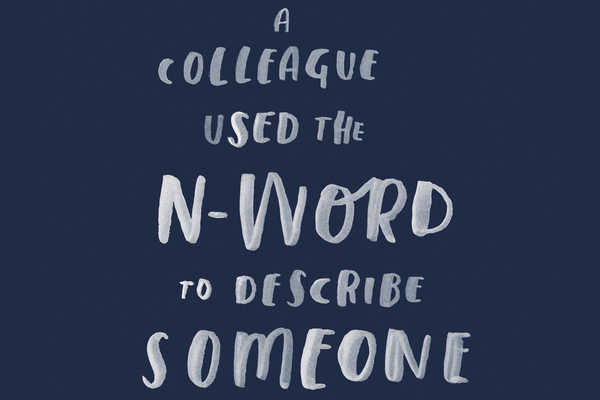You are viewing 1 of your 1 free articles
Housing’s gender bonus gap
New data shows that male housing staff are taking home more in bonuses. Kate Youde finds out how the sector is responding to these findings. Illustration by Jon Heal
Inside Housing’s Inclusive Futures campaign aims to increase diversity among the social housing sector’s leadership teams.
Click here for more information.
Bonuses – we all would like to get one. But at many organisations how they are calculated and who gets what is secretive, leaving staff wondering if they are fair or not.
Do they reflect wider inequality, both in terms of the gender pay gap and in terms of the work that men tend to do being paid more?
Analysis of new data on housing association bonuses shows that some organisations do reward members of staff differently for doing different types of work. But what does this tell us about how the sector values specialisms?
By April this year, businesses and charities with 250 or more employees had to report their first data to the government under the Equality Act 2010 (Gender Pay Gap Information) Regulations 2017. This legislation requires employers to publish the proportions of male and female staff receiving a bonus, and their median and mean gender bonus pay gaps.
Both the median and mean show the gender pay gap for bonuses in different ways – the mean is an average of all the bonuses paid, which tends to end up showing a big gap in organisations where a few individuals earn a huge bonus. The figures can therefore reflect that many high bonus earners are predominantly men.
The median is calculated by finding the ‘middle’ bonus paid to men and women in the organisation and seeing what the difference is – so, for example, that would mean making a list of all the women paid bonuses, and working out who is halfway down the list (so half of female staff would have a higher bonus, and half a lower).
Then that person’s bonus is compared to that of the median man.
The median is often used to show a more typical experience of the average employee, because the figure isn’t affected by very high earners.
Inside Housing analysed the data from a random selection of 50 housing associations. Of these, 35 paid bonuses during the 12 months to 5 April 2017.
Under the legislation, a bonus is a reward in the form of cash, vouchers, securities, securities options or interests in securities.
Eighteen of the 35 associations that paid bonuses had no median gender bonus gap (see below)
The gender bonus gap at 50 housing associations
| Housing association | Proportion of women receiving a bonus (%) | Proportion of men receiving a bonus (%) | Median gender bonus gap (%) | Mean gender bonus gap (%) |
|---|---|---|---|---|
| A2 Dominion | 76 | 74 | 0 | 50 |
| Accord | 0 | 0 | N/A | N/A |
| AmicusHorizon*2 | 89 | 84.3 | 0 | 8.4 |
| Aspire | 0 | 0 | N/A | N/A |
| Bromford | 93.4 | 90.8 | 0 | 0.7 |
| Bron Afon Community Housing | 0 | 0 | N/A | N/A |
| Catalyst | 74.6 | 69.7 | 0 | -0.9 |
| Clarion | 75.3 | 72.4 | -3.1 | 23 |
| Coast and Country Housing | 0.4 | 0 | N/A | N/A |
| Choices Housing Association | 30.3 | 45.3 | 0 | 33 |
| Devon and Cornwall Housing Association *6 | 1.1 | 22.2 | 21.2 | 19.6 |
| Family Mosaic*3 | 59 | 67.9 | 26.5 | 28.6 |
| Genesis*1 | 0 | 0 | N/A | N/A |
| Gentoo | 0.8 | 0.5 | 13 | 27.9 |
| Glasgow Housing Association | 0 | 0 | N/A | N/A |
| Great Places | 0 | 0 | N/A | N/A |
| Guinness Partnership | 58.3 | 50 | 0 | 4.3 |
| Halton Housing Trust | 79.7 | 78.8 | 0 | 0.9 |
| Hanover | 0 | 0 | N/A | N/A |
| Home Group | 10.5 | 9.2 | -635.2 | 51.4 |
| Housing & Care 21 | 40 | 22 | 0 | -1.5 |
| Hyde Housing | 92.9 | 87.8 | 1 | 8.8 |
| London & Quadrant Housing Trust*4 | 87 | 77 | 12.5 | 25.7 |
| Merlin Housing Society | 0.5 | 1.5 | -45 | -32.5 |
| Metropolitan Housing Trust | 5.2 | 8.5 | 57.1 | 53.7 |
| Midland Heart | 31.2 | 31.9 | 9 | 91 |
| Notting Hill Housing Trust *1 | 83.2 | 83.1 | 0 | 2.7 |
| One Housing Group | 65.2 | 69.2 | 0 | 46.9 |
| Onward Homes | 0 | 0 | N/A | N/A |
| Orbit Group | 69 | 69 | 15.7 | 23.8 |
| Origin Housing | 53.9 | 54.3 | 0 | -2.9 |
| Paradigm Housing Group | 0 | 0 | N/A | N/A |
| Peabody Trust *3 | 79.8 | 75.6 | 0 | 14.2 |
| Places for People Homes Ltd *5 | 2.1 | 1.9 | 91 | 80 |
| Plus Dane Housing | 0 | 0 | N/A | N/A |
| Riverside | 74.8 | 76 | 0 | 10 |
| Sanctuary | 1.8 | 2.9 | 0 | -4.1 |
| Sovereign | 58 | 61 | 55.2 | 20.8 |
| Stonewater | 89 | 72 | 27 | 56 |
| Thames Valley | 89.3 | 90.7 | 5.6 | 23.5 |
| Thirteen | 0 | 0 | N/A | N/A |
| Together | 0 | 0 | N/A | N/A |
| Viridian*2 | 39.9 | 57.9 | 0 | 82.9 |
| Waterloo Housing Group | 0 | 0 | N/A | N/A |
| WDH | 95.2 | 94 | 0 | 91.9 |
| WM Housing | 0 | 0 | N/A | N/A |
| Wrekin Housing Trust | 3.8 | 2.9 | 29.2 | 11.7 |
| Yarlington | 84.3 | 87.1 | 0 | 32.2 |
| Yorkshire Housing | 10.3 | 3.6 | 0 | -8.4 |
| Your Housing Group | 0 | 0 | N/A | N/A |
Notes:
*1 Genesis and Notting Hill Housing merged in April 2018 *2 Viridian and AmicusHorizon amalgamated in May 2017 *3 Family Mosaic is part of Peabody following a merger in July 2017 *4 These are figures submitted by the London & Quadrant Housing Trust, as opposed to the whole group *5 These are figures submitted for People for Places’ regulated housing activities. It says its median group bonus gap is 62% *6 DCH merged with Knightstone in March 2018 to create Liverty
A minus gender bonus pay gap means women are paid more than men
Women’s median bonus pay was higher than men’s at three organisations, and lower at 13.
Coast & Country could not calculate its bonus gap because, after agreeing with trade unions not to pay company-wide bonuses, it only issued one reward – a commission payment to a woman working in residential sales. A spokesperson says bonuses were not paid in 2017/18 and negotiations for 2018/19 are yet to be concluded.
But what about the mean gender bonus? Of the remaining 34 associations, women’s mean bonus pay was higher than men’s at six organisations, and lower at 28. WDH, which had no median gap, reported the highest mean gap of 91.9%.
"Organisations pay bonuses on a pro rata basis to part-time employees, the majority of whom are women"
The main reason for this is a performance-related pay scheme adopted by trade operatives, a group in which women are “under-represented”, according to a report accompanying WDH’s figures. It is looking to launch a trade apprenticeship programme targeted at women in 2019 as a result.
WDH also attributes its bonus pay gap to part-time working. Unlike gender pay gap figures, which use hourly rates so disregard the difference between full and part-time employees, the bonus gap calculations use the actual value of bonuses received.
Organisations pay bonuses on a pro rata basis to part-time employees, the majority of whom are women, so this can skew figures and make it look like women are being rewarded unfairly compared to men.
“It leaves you with a figure that’s not a reliable indication of the difference between the way you are treating male and female employees, because you are treating both of them exactly the same if you are paying them a bonus that is calculated in the same way – by how long they spend at work,” says Lorraine Heard, legal director at law firm Womble Bond Dickinson, who specialises in equal pay.
In March a House of Commons briefing paper, Women and the Economy, found that 42% of women in employment were working part time, compared to 13% of men, in the period October to December 2017. This is often driven by women taking on a large proportion of caring work for children and family members.
Research by Sheffield Hallam University’s Centre for Social Inclusion has suggested that a lack of part-time jobs above the lowest grades means women often work below their potential.
WDH, which Inside Housing approached for comment, was not alone in having a bonus scheme for trade operatives.
Midland Heart paid bonuses to 31.2% of female employees and 31.9% of men, but reported a 91% mean bonus gap due to its predominantly male property care workforce having a different pay framework to other colleagues.
The team has “less generous” employment terms compared to the rest of the organisation as, for example, workers receive statutory rather than occupational sick pay, but they can access a bonus.
These workers receive 80% minimum earnings and can be paid a 20% performance-related ‘top-up’, which brings salaries in line with median market rates for a direct labour organisation (DLO), based on their customer service, quality of repairs, completions on time, use of materials and efficiency, and customer feedback.
The “overwhelming majority” achieve their 100% earnings, says Baljinder Kang, director of HR and learning at Midland Heart.
The scheme incentivises quality repairs. “We have seen a direct correlation between the pay scheme and customer satisfaction, on the quality of the repair and the number of repairs completed on time,” says Ms Kang. Customer satisfaction has increased from 88.2% in 2014/15 to 92% in 2017/18.
Research from Mears last year suggests the proportion of women working in trades within repairs and maintenance teams at social landlords is 1%. In the past 12 months, only five of 190 applications for Midland Heart DLO roles were from women.
Ms Kang says the sector has “a real opportunity… to try and address some of the societal norms that exist, and try and break down what is seen as a traditionally male role”.
Midland Heart is teaming up with Women Into Construction, an organisation promoting gender equality in the industry, to launch work placements later this year.
As well as encouraging women into traditionally male parts of their businesses and investing in skills, Siobhan Endean, Unite’s national officer for equalities, says associations need “clear and transparent pay systems” based on an equality-proofed job evaluation scheme to address the gender pay gap. If organisations do pay bonuses, they should be “shared fairly” across the workforce.
“We need to get rid of the outdated mentality that says people who work with their hands need to be treated differently to people who sit behind a computer,” Alison Inman
Legally, Ms Heard says there is nothing wrong with paying a bonus to one group of staff and not to another with different roles as long as an employer has a justification.
However Alison Inman, president of the Chartered Institute of Housing but giving her personal view, questions why people working in trades need the incentive of a bonus and whether a lack of trust underlies different working arrangements. “We need to get rid of the outdated mentality that says people who work with their hands need to be treated differently to people who sit behind a computer,” she says.
She is “not a fan” of bonuses, saying: “I think we should pay people well for doing the job well.” But she finds the scheme run by Notting Hill Housing, which has since merged with Genesis, interesting. The association, which had no median gender bonus gap and a 2.7% mean gap, paid the same bonus to all staff. “That’s really important because if you’re a care worker, or an apprentice, or someone on the lowest salary scale that means more to you than the chief executive but the chief executive gets the same bonus,” says Ms Inman.
Devon & Cornwall Housing (DCH), which recently merged with Knightstone to form Liverty, withdrew a repairs-only bonus scheme in November and replaced it with one recognising the contribution of all employees in relation to customer satisfaction and financial performance.
DCH had the biggest percentage point difference in the proportion of employees receiving bonuses at the associations analysed, with 1.1% of women rewarded compared to 22.2% of men. It says its median gender bonus gap of 21.2% and mean gap of 19.6% are a reflection of a bonus scheme operated within its (predominantly male) repairs team in 2016/17 that was linked to performance including customer satisfaction, attendance at work and operatives’ driving.
Sheila Whelan, executive director of people and communications at Liverty, says the new bonus has the potential to pay out 5% of salary but, out of fairness and to “make the amount meaningful for everyone”, the minimum is capped at £800 and maximum at £2,400 subject to tax and national insurance deductions. “As the bonus is payable to all staff, and given we employ more women than men in total across the business, the impact will be positive in relation to the gender pay gap,” she says.
Gera Patel, partner at consultancy Campbell Tickell, thinks gender pay gap reporting will prompt many associations to re-evaluate their rewards schemes – either by taking them away or opening up conversations about their purpose. She says decisions regarding bonuses for many top roles are driven by the market and this is “inherently and intuitively biased towards men, particularly in finance, development and asset functions”.
“What’s interesting about bonuses is it’s difficult for any industry, including ours, to work out whether they are truly motivating or not, so when I am giving advice to remuneration committees… my starting point is, ‘Do you know why you are doing that?’” she says.
Inclusive Futures
Inside Housing’s Inclusive Futures campaign aims to promote and celebrate diversity and inclusion.
We are pledging to publish diversity audits of our own coverage.
We are also committed to proactively promoting positive role models.
We will do this through the pages of Inside Housing. But we will also seek to support other publications and events organisations to be more inclusive.
Our Inclusive Futures Bureau will provide a database of speakers and commentators from all backgrounds, for use by all media organisations.
We are also challenging readers to take five clear steps to promote diversity, informed by the Chartered Institute of Housing’s diversity commission and the Leadership 2025 project.
INSIDE HOUSING’S PLEDGES
We will take proactive steps to promote positive role models from under-represented groups and provide information to support change.
We pledge to:
Publish diversity audits: We will audit the diversity of the commentators we feature. We will formalise this process and publish the results for future audits twice a year.
Promote role models: We will work to highlight leading lights from specific under-represented groups, starting in early 2018 with our new BME Leaders List.
Launch Inclusive Futures Bureau: We will work with the sector to compile a database of speakers, commentators and experts from under-represented groups. The bureau will be available to events organisers, media outlets and publications to support them to better represent the talent in the sector.
Take forward the Women in Housing Awards: Inside Housing has taken on these successful awards and will work to grow and develop them.
Convene Inclusive Futures Summit: Our new high-level event will support organisations to develop and implement strategies to become more diverse and inclusive.
THE INCLUSIVE FUTURES CHALLENGE
Inside Housing calls on organisations to sign up to an inclusive future by taking five steps:
Prioritise diversity and inclusion at the top: commitment and persistence from chief executives, directors and chairs in setting goals and monitoring progress.
Collect data on the diversity of your board, leadership and total workforce and publish annually with your annual report. Consider gender, ethnicity, disability, sexuality, age, and representation of tenants on the board.
Set aspirational targets for recruitment to the executive team, board and committees from under-represented groups.
Challenge recruiting staff and agencies to ensure that all shortlists include candidates from under-represented groups.
Make diversity and inclusion a core theme in your talent management strategy to ensure you support people from under-represented groups to progress their careers.














